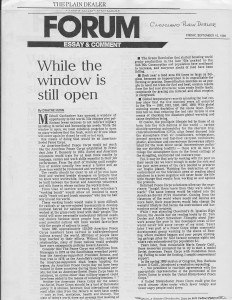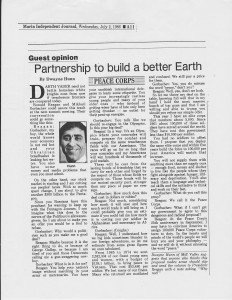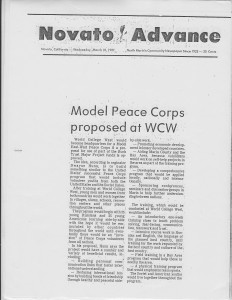Cleveland Plain Dealer’s Open Forum:
“Gorbachev world needs you.”

Cleveland Plain Dealer, 9-15-1989
While the window is still open, FORUM
Dwayne Hunn
Gorbachev has opened a window of opportunity to the world. His changes give all politicians fewer excuses to not redirect military spending to pressing social and humanitarian needs. While the window of opportunity is open, we must establish programs that will open so many windows that the fresh, warm air of new ideas will never again be closed by cold or hot wars.
One means of doing that is with an American-Soviet Peace Corps.
An American-Soviet Peace Corps would act much like the American Peace Corps established by President Kennedy in 1961. Soviet and American volunteers would train for at least three months in language, custom, and work skills essential to their job performance. From the start of training until completion of service (usually two years later) a Soviet and an American would be roommates and workmates. This small program difference from the American Peace Corps could make a world of difference.
The results should be clear to all of us who have experienced living and working alongside strangers on projects that we knew were worthwhile endeavors. Interpersonal bonds will be built between the Soviet and American volunteers as well as with those in whose nations the work is done.
From their time of service onward, each volunteer’s “working bonds” will allow all involved to more easily “reach out and touch someone” who may be half way around the world. The world will more quickly become a global village of friends.
These working bonds will make it more difficult for radicals or narrow minded bureaucrats to develop national hatred for nations whose volunteers have worked at the grassroots level with their people. The world will more personally understand national needs and desires because more people from the world’s most powerful nations will have worked face-to-face with the people of nations in need.
Since 1961 approximately 125,000 American Peace Corps have served in underdeveloped nations around the world. Millions of people in underdeveloped nations have been touched by the efforts of those volunteers. Without those efforts and resulting relationships, many of those nations would probably have more antagonistic policies toward America.
Consider this. The Peace Corps was withdrawn from Nicaragua in 1979, as the Sandinistas wrenched power away from the American supported President Somoza; and from Iran in 1976, as the Ayatolla’s campaign against the American supported Shah began toppling the Shah’s regime. An American Peace Corps may not have been wanted in those countries during those troubled periods, but had an American-Soviet Peace Corps been in existence then, an option other than military support could have been added to the means of reducing tensions in those areas.
Neither the American Peace Corps nor the American-Soviet Peace Corps should be a tool of diplomatic policy. It is obvious, however, that international crisis most often stem from the failure to provide unmet basic needs — such as food, sanitation, health and literacy. The state of today’s world does not presage that delivery of those needs is about to drastically improve.
- The Green Revolution that started boosting world grain production in the late 60’s peaked in the mid-80’s. Consumption and population has continued to increase and carryover stocks of food have been falling.
- Each year land area 6.5 times as large as Belgium becomes so impoverished that they are unprofitable to farm or graze. Desertification marches on as people in need cut trees for fuel and heat; erosion results from the lost root structures; rains erode fertile lands; rangelands for grazing are reduced and what remains is overgrazed.
- Global temperature records spanning the last century show that the five warmest years have all occurred in the eighties – 1980,1981,1983,1987,1988. With global warming comes the depletion of the ozone Scientists tell us that restoring the lost rain forests is one of the means of checking the disasters global warming and ozone depletion bring.
Of course, the profligate lifestyle lead by those of us born into the rich nations of the world — carbon dioxide spewing automobiles for the shortest trip; chlorofluorocarbons (CFCs, alias freon) dumped into the atmosphere from air conditioners, refrigerators, aerosol sprayers and fast food carryout containers; plastic, aluminum and convenience throwaways substituted for the most minor social inconvenience polluting our shrinking landfills; these acts do more to ravage the atmosphere than do the forest cuttings of the struggling, uneducated and unaware poor.
Yet, it may be that only by working with the poor on their needs can we learn enough to make the rich and the poor more aware of the care needed to preserve our fragile planet. Watching the destruction of our environment on the television news or reading about solutions in a newsmagazine will never foster the lifestyle change that results from working on and against the problem.
Returned Peace Corps volunteers often say that the Peace Corps experience “taught them more than they were able to teach.” The same lessons would be etched into the American-Soviet PCVs character. Coming from the classroom of the world where needs and desires are more basic, their experiences would help change the wasteful lifestyle that harms the environment and harmonious social progress.
While attending Cleveland’s St. Ignatius High School, the Jesuits had me reading books by Dr. Tom Dooley and Albert Schweitzer. Thoughts about the authors’ work among the poor in less developed areas of the world never left some corner of my mind. Years later I was part of a Peace Corps Urban Community Development Group working in the slums of Bombay where maimed beggars, poor people scavenging garbage piles for food became common sights and where rats outnumbered the population 5-1.
Years later, from comfortable Marin County California, those memories prompted me to try to start a model Soviet American Peace Corps with foundation funding. Failing to raise the needed funding, I sought Congressional support.
In the spring 1989 session of Congress, Congresswoman Boxer introduced HR 1807 requesting:
“… the President to conclude agreements with the appropriate representative of the Government of the Soviet Union to create the United State-Soviet Peace Corps.”
A United States-Soviet Peace Corps could give the world cleaner skies under which fewer hungry and fewer angry people could sleep.



